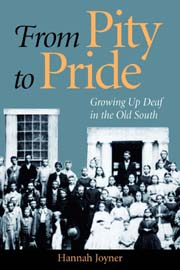Growing Up Deaf in the Old South
Hannah Joyner
|
Read chapter seven. Read reviews: Choice, Daily News, Disability Studies Quarterly, The Journal of American History, The Journal of Southern History. |
$57.50s print edition $57.50 e-book |
From The Journal of Southern History
Most people perhaps think deafness is severe hearing loss that significantly limits interpersonal interactions and social functioning. Hannah Joyner and other deaf history and deaf studies scholars distinguish the medical audiological condition of deafness from the political-cultural experience of deafness. Noting that “cultural meanings of deafness are always created within a particular time and place,” her monograph adds to second-wave deaf history scholarship by examining the experience of deafness in the antebellum and Civil War-era South (p. 5). Shaped by the region’s distinct sociocultural, political, religious, and economic arrangements—and class structure and gender constructions centered on the slave plantation system—experiences of deafness varied according to race, class, and gender.
Joyner focuses on deaf individuals, mostly male, from several wealthy, slaveholding, white families. Men from elite families typically stood at the top of the social pyramid, masters over a host of dependents that included African Americans, poor whites, women, and—previously overlooked by historians—people with disabilities. But for these elite young white men being deaf cast them as inferiors and dependents instead of masters. While deaf people, North and South, faced hearing prejudice and discrimination, deaf southerners confronted particular forms of oppression growing out of the region’s culture of paternalism and dependency. A few of the elite deaf people presented here came to spurn the dominant view of deafness as a misfortune and an incapacitating affliction. They joined with other deaf Americans across the nation and established themselves as competent, self-directing members of deaf communities.
Joyner takes issue with the notion of an antebellum golden age of manualist education that accepted deaf people as social equals in contrast to the late-nineteenth- and early-twentieth-century shift to oralism, which suppressed American Signed Language and attacked the deaf community’s very existence. She counters that most antebellum deaf schools were headed by paternalistic hearing men and staffed by hearing teachers who saw deaf people as inferior and dependent.
To reconstruct the southern ideology of deafness, Joyner draws on correspondence within elite families and from southern schools’ annual reports. These sources depict deafness as unrelenting silence, deep isolation, and hopeless gloom, with the deaf cut off from both the natural world and true human connection, not even knowing the names of their own mothers, fathers, brothers, and sisters. Considered social outcasts, aliens, and foreigners in their own families and homeland, they were assumedly trapped in total ignorance of both human civilization and God’s saving truth, their mental and moral state akin to that of heathens and savages in “dark” lands. Thus, the discourse of deafness paralleled the discourse of race. Sometimes deaf people were depicted as barely human, animalistic. Deaf children were often portrayed as disorderly and undisciplined and deaf adults as lacking self-control, with all at risk of becoming idle, immoral, permanently dependent on charity, and burdensome to their families and communities.
In response to these problems and dangers, parents of deaf children and advocates of deaf education declared two imperatives. Parents sought cures through strenuous, often excruciating, virtually always unsuccessful treatments. Educators promised parents and the state legislatures that they would redeem deaf children. In contrast to their dire descriptions of untrained deaf people, educators pledged religious enlightenment, moral instruction, and preparation for productive responsible membership in society. Their hyperbole about both the extremity of deaf children’s situation and the transformative power of schooling suggests that historians need to examine such rhetoric critically, for it may reflect pragmatic fundraising strategy rather than culturally entrenched ideology. We need to build on useful monographs such as this one to explain the historically specific instructions of the meaning of deafness and, more broadly, disability.
Hannah Joyner is an independent historian in Takoma Park, MD.
Print Edition: ISBN 978-1-56368-270-4, 6 x 9 casebound, 224 pages, references, index
$57.50s
E-Book: ISBN 978-1-56368-316-9
$57.50
To order by mail, print our Order Form or call:TEL 1-800-621-2736; (773) 568-1550 8 am - 5 pm CST
TTY 1-888-630-9347
FAX 1-800-621-8476; (773) 660-2235
